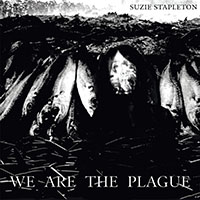 We Are The Plague - Suzie Stapleton (Negative Prophet)
We Are The Plague - Suzie Stapleton (Negative Prophet)
Suzie Stapleton is a lifer: a singer songwriter guitar, violin and piano player and a rare breed of musician. She is the complete package. From the angular arrangement of melodies to the blues that float around her head, music is a 24/7 occupation..
Originally from Sydney, this artist knew that Melbourne was where she needed to be to develop her craft and skills by playing solo, and with all sorts of musicians, both live and in the studio. She became highly respected in that town.
I first saw her at the Prince of Wales in Melbourne with a cellist accompanying her, and Suzie completely claimed the room as her own. Even the most ardent St Kilda, beer-in-hand, rock pigs were blown away Two EPs were released and licensed in Europe, where word soon spread about her atmospheric vocal, guitar playing and original and dark arrangements.
Suzie made her way to England a few years ago and retuned to Australia, but decided that Europe was where she needed to have her base. Suzie now resides in a bastion of alternative music, the windswept Brighton, the seaside town with an ugly pebble beach and a strong arts community.
This is her debut album. It is also my Album of the Year.
It opens with the street carnival sounds of mechanical laughing clowns, mixed with children’s laughter. It's the title track. And then, “We Are The Plague” explodes.
It’s a song that really has nothing to COVID-19 as it was recorded and written prior to the onset of the pandemic. But it fits. Like a doomsday prediction. It is a stark statement on global warming and animals becoming extinct in alarming numbers. A protest song. The bass sound is straight off the first PIL album with sparse drums and the metallic guitar sounds of a Fender Jaguar. It builds and builds before being stripped down to a whispered monologue with layers of feedback. Then there’s the arpeggio and finally it becomes a a rock work out.
Be warned, the rest of “We Are The Plague” will claim the next 50 minutes of your life.
“Thylacine” keeps the circular, repetitive bass line going but matches it with layers of reverb-soaked vocals and jabs of icey guitar. Whispering, haunting vocals that are layered with a repeated arpeggio and a guitar that enters like a sonic waterfall and then disappears back into the chorus.
“Blood on the Windscreen” is sheer drama with violent imagery. It’s a showcase for the solid rhythm section of Gavern Jay on bass and Jim McCawley on drums. The sparseness works and in synch with the drama within Suzie’s songs. When all three explode in unison, it shakes floorboards
“September” is tender and haunting, and the most accomplished and well-crafted song here. It’s melodic with a powerful hook. As with all Suzie's material, it’s teased, distorted and placed back together. And it should be on every rock playlist across the world.
Again, it’s the sense of drama that strikes you - and none of these songs ends where they begin. Each seems to have its own organic movement and free flow, every note carefully placed as close to the edge that the onset of chaos would allow. Suzie is actually an exceptional musician; and that's why the deconstruction works. In the hands of a lesser player, it would end up a mess.
“The River Song” is a powerful, spiritual hymn with its roots in the cries of enslavement in Mississippi, It is Suzie’s most ambitious song on the album, stripped back to a primal shuffling, circular beat. Suzie’s vocal is the cry of someone trapped in a haunted Methodist church with the Book of Ephesians being preached as we are granted admission. It works and is a haunting piece of music, wrapped around a powerful chant. It’s been the highlight of Suzie’s live set for some time, and it’s a significant work. This territory that Nick Cave has attempted to claim. Suzie Stapleton sounds authentic and certainly more fair dinkum.
“Angel Speak” is a look in the rear mirror of Susie’s previous EP and I have a sense off the same guitars and strings as they float across the horizon. It sounds like a eulogy from another time. It’s in “Silence in My Bones” where I hear the nod to British atmospheric sounds like Kate Bush and This Mortal Coil. Suzie’s arsenal is much more powerful with discordant guitar and overlays of feedback.
The album finishes with “Negative Prophet”. I am going be so bold as to interpret this as another protest song; maybe not, but the title is timely. Suzie’s distinctive vocals move from a wallow to a minimal whisper as we are taken from an old wooden shack of a church on a river’s banks before we’re transported top a cathedral. Majestic and grand.
Suzie’s music draws from such a diverse tapestry of influences. It ramnged from the dark sounds of This Mortal Coil to classic late period Soundgarden, to Rowland S Howard. Unique music is rare and is to be cherished. Few actually attempt it and fewer achieve it. This is a memorable work by a significant Australian artist.
 (Really 500 bottles and a few quarts of Tequilia)
(Really 500 bottles and a few quarts of Tequilia)
Buy it

